- Home
- John Jakes
The Bastard: The Kent Family Chronicles Page 35
The Bastard: The Kent Family Chronicles Read online
Page 35
“But there’s a kind of distant hope in your voice when you say that. Did you realize it?”
“No,” he lied, clambering out onto the pebbled shore. He took her hand, felt her breast brush his arm as he assisted her from the rowboat. As he reached down for the hamper, she said:
“What is it you want, Philip?”
“You’ve asked me that before.”
“Yes, but you didn’t answer. Realistically, anyway. You’ve escaped the family’s reach, surely. You should be moving toward something now, not simply away. So what’s the goal to be?”
“Food.”
She laughed. “All right. Shall we try Morton’s Hill? It’s pleasant. But answer my other question, if you will.”
As they climbed through the fragrant long grass, he responded at last, “I’d say I want to be a man of property one day. Own my own printing house—”
“Then go back to England and flaunt your position to those people? As you told your mother you would before she died?”
“To be realistic, as you call it, I think that’s out of the question.”
Half way to the summit of the hill, she touched him again, brought him facing around so that he saw her framed against the late summer green of the hilly pastures, and the church spires, the jumbled rooftops, the harbor masts of Boston across the river. Some of those masts belonged to an English naval squadron.
“Even yet you don’t sound certain, Philip.”
“Well, then, dammit, maybe I’m not.”
“Do you recall what I’ve said before—echoing Mr. Adams? A time comes to everyone when a choice must be made. A direction must be taken. You can’t evade that forever.”
He was disconcerted by the firmness with which she spoke; even though their ages were the same, at the moment she seemed the more adult. Perhaps it was because her own direction was already charted.
“Yes, I’m aware that you know where you’re going. A husband you can live beside. Not just raising children but working with him to make a success of his trade, his profession—”
“Oh, but that won’t come immediately,” she said, starting to climb the hill again. “It can’t, even if—the proper man should drop from heaven this minute. The future’s too uncertain. The questions that obsess Papa and Mr. Adams and the others must be decided before any of us are free to pursue other ends. One of my goals is to see that happen. To help it happen, if I can.”
“You really do have conviction about the cause, don’t you?”
“Yes. You know I won’t retreat from the world like women are supposed to do. And I not only love my father, I respect most of his ideas. Except for the ones concerning the female’s role!”
“You seem to have gotten around that obstacle,” Philip said, wry. “He lets you have your head—go where you wish—doesn’t he?”
“True. The dear man realized that battle was lost a long time ago. Seriously, Philip—when it comes to the law, politics, he’s a solid thinker. That’s influenced me to place importance where he places it. I’ve thought matters over for myself, too. Or tried. Resistance is right and proper. I should think all you experienced in England would bring you to the same conclusion. The world is changing. People won’t permit themselves to be put upon by kings or persons of privilege any longer. You mentioned that tutor you had in France. He knew choice was inevitable, didn’t he?”
Philip nodded. “I think so. I’ll make mine one of these days.”
“Unless you wait too long and have it forced on you by the pressures of the moment. Believe me, I’ve read enough history in Papa’s library to know that chance plays its part. But I think it’s better that a man—or a woman—make a choice by his or her own will, not simply be thrust along by events, willy-nilly.”
“Anne—” He scanned the shimmering hilltop, the hazed sky beyond, set the hamper in the grass. “I’ve made one.”
“What is it?”
“To tell you I care for you very much.” The wind whispered through a moment of silence. “That I want you very much.”
Flushing again, she picked up the hamper. “Let’s go on to the top. The mutton won’t be good if we don’t soon—”
“Anne.”
He tightened his hold on her forearm, then took her other arm as well. Slowly, he pulled her down beside him in the wind-rustling grass.
He slipped an arm around her shoulder, the excitement in his own flesh relentless now. From the tiny glisten of perspiration on her upper lip he guessed she was experiencing a similar reaction.
“I’ve waited months for a time like this, Anne.”
“Philip, I can’t. I mean—”
She stopped as he thrust her backward in the grass, cushioning her with his arm. She didn’t resist. But there was a flicker of unhappiness in her brown eyes as he stretched out beside her, brought his face down close to hers and kissed her.
He touched her mouth tenderly, marveling at its soft warmth. Then he raised up on one elbow. She gazed at him, looking almost frightened. Her voice sounded small:
“I knew that if we came here—somehow I knew that we—oh.”
Giving that strange, almost sad little murmur of surrender, she closed her eyes and lay very still.
He bent close again, stroked the softness of her hair, the sun a fire on the back of his neck. The fire spread through him as he brought his hip against hers.
She still didn’t pull away. But there was a resistance, a tension in her that he could feel. Fear?
He kissed her again. This time, her mouth responded. One of her arms stole around his neck. His shirt touched her breasts. She moaned softly, turning against him, clasping him tighter while they kissed with the ardor of the young and the heat of the golden September—
Hidden in the meadow grass, the world lost except for the faraway clank of a cow’s bell, they kissed a long time. His mouth caressed her eyelids, the fragrant strands of her hair. The grass was heady with the perfumes of autumn, but no headier than her breath when, at last, her lips parted and he tasted her sweet mouth—
Another surprised little cry deep in her throat told him she’d felt the change in his body. Felt it because they lay so close together, nothing separating them except rumpled clothing. A boatman on the river hailed someone. The sun blazed, showering down gold light to drown them in warmth, to stoke the quick-breathing eagerness of mouths, the tremble of hands exploring—
For Philip there was no holding back. The blood-tide was running too high. He began to tug at the hem of her yellow muslin skirt. He thought she started to draw away, make a sound—perhaps a word of negation—but with the hammer of his own heartbeat so loud in his ears, he couldn’t clearly tell.
The skirt came upward. His hands sought her. Warm, private places, tingled his fingertips. He felt passion change her body, as his had changed—
The meadow grass rippled in the wind, a whispering. Cries of gulls drifted from the harbor. The hot light poured down as her own hands moved, over him—and his grew bolder—
Jolted, he rolled back a second after she pulled away.
She thrust down her skirt as his eyes flared with anger. Sitting up, she brushed off her bodice. She wouldn’t look at him.
“For God’s sake, Anne, what’s the matter?”
“Philip, this was foolish. Foolish and wrong. I shouldn’t have come with you. I shouldn’t have let you think—oh, dear heaven, please forgive me?”
A hint of tears showed in the corners of her dark eyes. He stood up, his hair ribbon loosened in the tumbling. The ribbon snapped in the breeze as he gazed down at her. He was trembling from fury, from astonishment, from the sudden chilling of the September sun.
“You’re denying you want the same thing I do?”
“I—Philip—”
“You can’t deny it.”
She clasped her hands around her knees, bowed her head. Her voice sounded as he’d never heard it before. Unsure:
“No, I can’t. But—”
Abruptly her head came up.
The autumnal sunlight caught fire in the tears streaking her cheeks. Yet he still recognized the Anne Ware he’d met on that first day in Mr. Henry Knox’s bookshop.
“But I will not have it.”
“Oh,” he shot back, almost snarling, “a man working his will on you—is that it? Well, by Christ, you’ll never get any man to touch you if you insist on—ah!”
Angry at himself, he pivoted away. “I’m sorry.” He dropped to his knees beside her, took both her hands in his. “From the way you kissed me—Anne, I felt what you wanted.”
“Yes,” she said, unsteadily, “that’s true. It’s a bright, hot day. We’re safe here, we’d never be caught, but—Philip, I’ve loved no man yet, not that way, not in nineteen years. I—I can’t do it so casually.”
“Can’t because a man wants it?”
“I don’t blame you for anger—”
He stood up. “I just don’t understand.”
“—and you’ll think me a prude—”
“You don’t kiss like a prude. Anything but a prude. Anne—”
“Listen, please listen! It was my fault. I was foolish and wicked to lead you on. I didn’t mean to do that—” The words spilled out rapidly now, as she dashed tears off her cheeks. “But when the time comes, there must be—there must be some other reason besides the heat of a September afternoon.”
Glum, he felt his wrath fading away. He knew all too well what she meant:
“Love.”
The grass bent and rustled in the wind. All joy had gone out of the day. Anne’s face remained averted:
“Yes. Otherwise, it’s like the rutting of a slut and someone who’s paid her. Do you understand that, Philip?”
The cries of the gulls rang in the distance, forlorn.
“I do. You want another choice out of me.”
“No, I didn’t ask for—”
“But it’s what you want. What you must have—though you’ll forgive me if I can’t square the wish with other things you say.”
“What things?”
“That talk about your mother, for instance. She married because it was the accepted way. She put herself in bondage. That was also love, wasn’t it? You said it was—”
“Yes.”
“And she died of it.”
“Yes.”
“Yet you want that same bondage? From a man? And for yourself too? Is that your much-touted liberty, Anne?”
“For my mother, marriage was—surrendering.”
“Which is precisely what you’re getting at, isn’t it?”
“No. No, there’s a difference. I don’t know whether I can say it correctly—I’m not saying anything correctly—yes, loving someone is a bondage. But that kind of bondage—to a person, or even to an ideal—you enter it freely. You go toward it, you don’t use it to escape something—”
“Pardon me, but the difference is pretty Goddamn subtle. How do you decide which kind is which?”
“You—just know. Does it fulfill you, or—or destroy you?”
Too upset to cope with such thoughts for long, he made a sharp gesture. “Well, you may be right. But whatever sort of choice you’re after—fulfilling, destroying—running toward, running from—it’s one I can’t make.”
This time her nod was heavy with sadness. “I’m not half clever enough. I think I already knew. And I still said yes to coming here. Realizing what might happen. Wanting—” Her head lifted; her eyes brimmed with sorrow. “—wanting it more than a little.”
“Don’t lie to me.”
“I’m not! It’s the truth! But I was terribly wrong to let it go so far—”
Kneeling beside her again, Philip put two fingers on her still-warm mouth. He was troubled and utterly miserable. He concealed it in the protection of a curt laugh:
“Don’t score yourself. The error’s mine, Mistress Ware. I’d forgotten just how infernally strong a female you are. What positive ideas you have about every sort of human action. You want to be sure of certain things, but to use your words, fair’s fair. Don’t I get the same privilege?”
“Of course. Of course you do.”
“I do apologize for trying to work my will, as they call it. A mere man, demanding—”
“Stop it, Philip! I told you that has nothing to do with it.”
He knew it didn’t; he was ashamed he’d attacked her that way a second time.
To calm the churning of his own emotions, he tried to smile; it was a grimace. “Best we drop it. Here—” He speared the hamper, held it high. “Let’s not waste the mutton and good sunshine.”
“I—I’m still afraid you’re angry—”
“I’m absolutely enraged with you, my girl. And the crazy thing is, that makes me want you all the worse. So badly I ache—damned if I know why. I should row back to Copp’s Hill pier and leave you stranded. I guess I won’t, though—”
“I’m surprised,” she said with a rueful smile.
“Are you? Don’t be. There—” He couldn’t pretend; he could only speak the painful truth of his own heart. “—there’s something in you I admire even when you turn me away. Maybe I admire you because you turn me away—I’m plagued if I know enough about women to figure it out! But in your own way, you’re tougher than old Adams at his wildest. Come on.”
He extended his other hand to assist her. She kept her hands at her sides.
As they started to climb again, he went on, “I wish I could lie to you, Anne. I wish I could pretend I can give you what you say you’ve got to have. That’d bring everything to a nice, neat solution—”
“But I’d know you were lying—if you were.”
“Bet you would at that,” he sighed. “Well, anyway, I can’t do it. Making promises is impossible.”
She stopped and looked at him, her eyes so intense that he felt they reached and wrenched at whatever soul or central essence lay in the depths of his being:
“For now? Or forever?”
His mind swirled with memories of Kentland, of his mother, of what he could have been—and might yet still be. Damn heaven, what did he want?
He said, “Anne—I don’t know.”
Turning, he stalked on up toward the searing light of the hilltop.
He wished he could lose himself in that fire, be consumed, destroyed, relieved of thinking, of decisions, of trying to unlock the riddles of the whole damned world—and himself—
He managed to calm down and occupy his attention with opening the hamper. In a few moments, Anne joined him. She seated herself beside the cloth he’d spread. Her cheeks were reddened but the tears were gone.
As Philip unpacked the food, he said in an offhand way, “I imagine you’ll want me to stop calling after this.”
Her smile, though forced, puzzled him until she said:
“That’s the last thing I want, Philip. Like these colonies, you’ll make choices. One way or another, something will become of you. I’d like to find out what.”
She glanced away. “However, the decision is yours.”
vi
They passed the remainder of the afternoon in repetitious speculation about the tea crisis and empty pleasantries about the beauties of the early autumn weather. While he rowed her back to Boston in the twilight, neither of them said a word. He left her at the door in Launder Street with a quickly murmured goodbye, and without touching her.
He slept very little that night. The September afternoon had focused the question to unbearable sharpness: What was his ambition? His future? And how much of the choice would be his and how much the result of events he could not control?
Tossing restlessly, he concluded that he must be falling in love with Anne. Nothing else would explain his feeling so forlorn, furious and confused.
vii
Express riders galloping in across Roxbury Neck in late October brought news that a mass meeting in Philadelphia had forced the resignation of the tea agents appointed for that city. A similar meeting was convened locally. But Governor Hutchinson’s nephew and two o
f his sons who had been appointed to the potentially lucrative posts would not relent.
Adams and his followers thundered denunciations of the tea consignees. Called them traitors, enemies of America. To no avail.
Then, on the twenty-seventh of November, Dartmouth, the first of three vessels reported on the way to Boston with the hated cargo, was sighted offshore.
The following night, Philip and Benjamin Edes labored almost until dawn. They set, proofed and printed copies of a sheet circulated throughout the town and nailed to the Liberty Tree next morning:
FRIENDS! BRETHREN! COUNTRYMEN!
That worst of plagues, the detested tea, shipped for this port by the East India Company, is now arrived in this harbor; the hour of destruction or manly oppositions to the machinations of tyranny stares you in the face. Every friend to his country, to himself, and posterity is now called upon to meet at Faneuil Hall at nine o’clock this day (at which time the bells will ring), to make a united and successful resistance to this last, worst and most destructive measure of administration.
Philip had no idea what Anne Ware thought about the atmosphere of tension and anger mounting hourly in the city. Since the day in September, he had not visited Launder Street once, and had arranged to be occupied in Edes’ back office whenever he spied the girl turning into Dassett Alley on her way to the shop. By now he was not entirely sure whether his reaction came about because he was in love with her, and feared it, or because he wasn’t.
The tea ship docking at Griffin’s Wharf brought accelerated activity among Edes and his friends. It also provided Philip with welcome diversion from the weeks of painful doubt and introspection, weeks which had still produced no definite answers in his own mind.
viii
He could keep himself physically separated from Anne, it seemed. But he couldn’t prevent her from coming to him in other ways. Two nights after Dartmouth anchored, he dreamed about her—a heavy, sensual dream in which he glimpsed her naked through mist or smoke.
He groaned, rolled over on the cellar pallet, coughed, smelled the tang of his dream in the damp darkness—

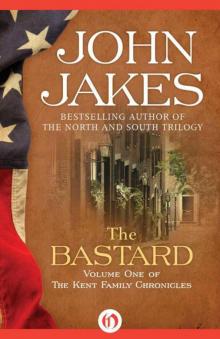 The Bastard
The Bastard The Furies
The Furies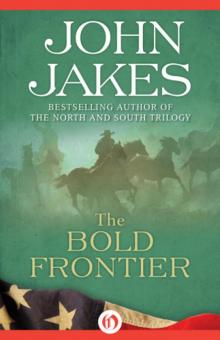 The Bold Frontier
The Bold Frontier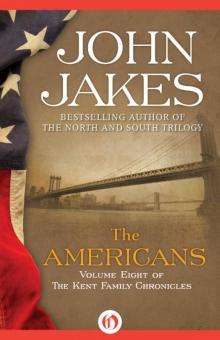 The Americans
The Americans Mention My Name in Atlantis
Mention My Name in Atlantis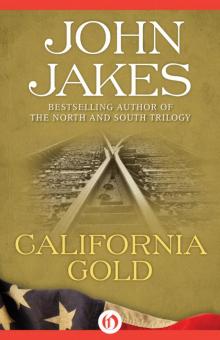 California Gold
California Gold North and South
North and South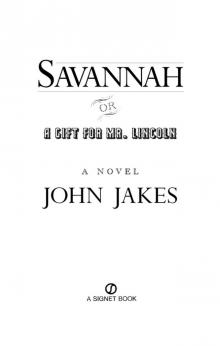 Savannah, or a Gift for Mr. Lincoln
Savannah, or a Gift for Mr. Lincoln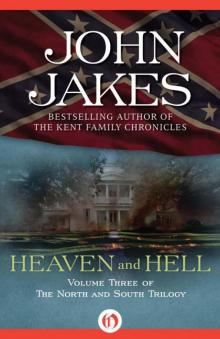 Heaven and Hell
Heaven and Hell Homeland
Homeland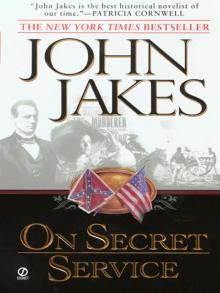 On Secret Service
On Secret Service The Lawless
The Lawless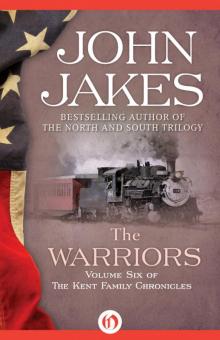 The Titans
The Titans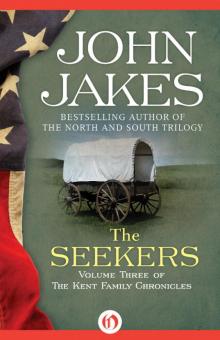 The Seekers
The Seekers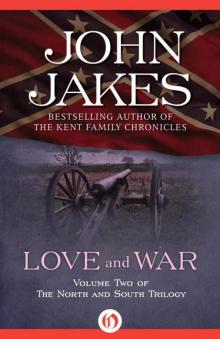 Love and War
Love and War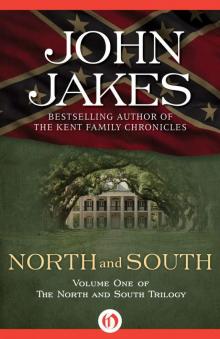 North and South: The North and South Trilogy (Book One)
North and South: The North and South Trilogy (Book One)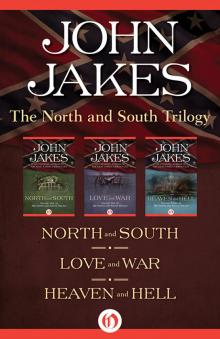 North and South Trilogy
North and South Trilogy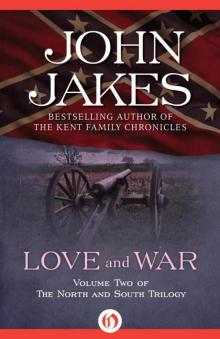 Love and War: The North and South Trilogy
Love and War: The North and South Trilogy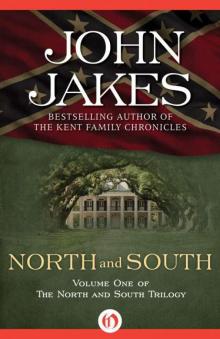 North and South: The North and South Trilogy
North and South: The North and South Trilogy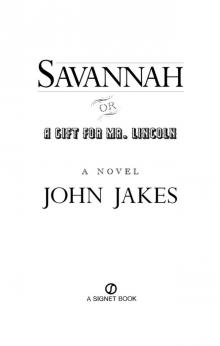 Savannah
Savannah Lawless
Lawless Conquest Of The Planet Of The Apes
Conquest Of The Planet Of The Apes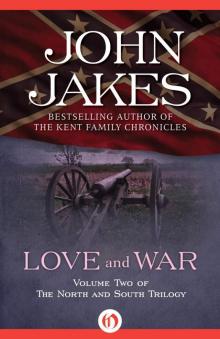 Love and War: The North and South Trilogy (Book Two)
Love and War: The North and South Trilogy (Book Two)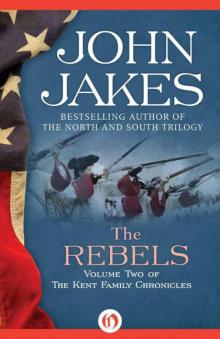 The Rebels: The Kent Family Chronicles
The Rebels: The Kent Family Chronicles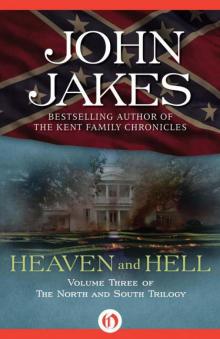 Heaven and Hell: The North and South Trilogy
Heaven and Hell: The North and South Trilogy Planet of the Apes Omnibus 2
Planet of the Apes Omnibus 2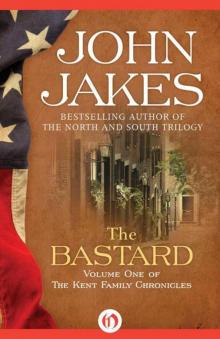 The Bastard: The Kent Family Chronicles
The Bastard: The Kent Family Chronicles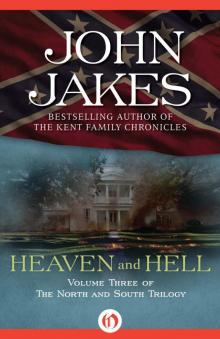 Heaven and Hell: The North and South Trilogy (Book Three)
Heaven and Hell: The North and South Trilogy (Book Three)